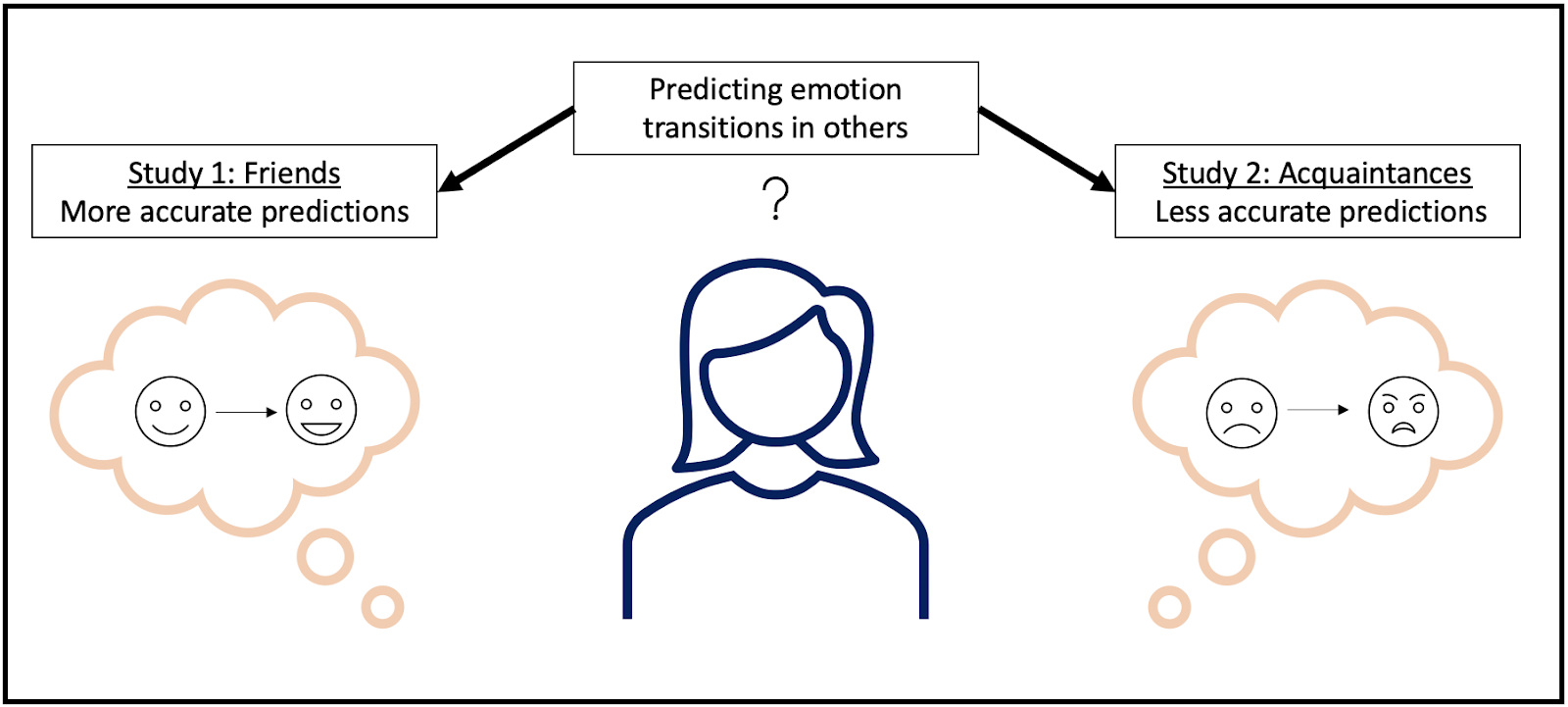Review written by Rohini Majumdar (PSY)
People tend to transition between emotional states in predictable patterns. We use what we know about how others are feeling in the moment to predict how they might feel in the future. Specifically, we make these predictions based on our knowledge of emotional state transition patterns from observing ourselves and others. Research has shown that benefits of social perception and prediction include positive real-world social outcomes such as stronger relationships with friends, higher satisfaction in romantic relationships, greater acceptance from peers, and more success within one’s community.
In a recent study, three researchers from Princeton’s Department of Psychology, Zidong Zhao, Mark Thornton (now an assistant professor at Dartmouth), and Diana Tamir sought to investigate how accurately people can predict certain individuals’ future emotions. Specifically, they were interested in whether this varies by how well or how long people have known each other, and whether accurate predictions offer any social benefits.
Zhao and colleagues recruited first-year undergraduate students at Princeton to participate in two studies with similar designs but different objectives. In both studies, participants completed an emotional transition task three times total for three different targets: themselves, their friend, and the average student at Princeton. In Study 1, the researchers sampled pairs of close friends who had lived in the same community for at least one semester. In Study 2, participants were pairs of newly acquainted roommates. This distinction was used to see if target-specific knowledge acquired over longer-term friendships improves emotion prediction accuracy.
In the aforementioned emotional transition task, participants envisioned one of the three targets in question (e.g., friend or new acquaintance) and were shown a pair of emotional states (e.g., happiness → elation). They were then asked to estimate on a continuous scale of 0-100% the likelihood that, if the target was experiencing the first state (e.g., happiness), they would experience the second state (e.g., elation) next. The accuracy of these predictions was assessed by comparing a given participant’s ratings of their friend to the ground truths from the friend themself (i.e., the friend’s self-reported ratings of their own emotion transitions). This comparison enabled the researchers to measure whether people can accurately predict emotions in close friends (Study 1) and new acquaintances (Study 2). In addition, they compared a given participant’s ratings of the average group member against the sample’s average self-ratings to see whether people can accurately predict the emotions of the average group member. The authors expected both individual and group-level predictions to be less accurate in Study 2, since the participants in that sample likely had less specialized knowledge about each other and the group, having known each other for a shorter period of time than participants in Study 1.
A series of analyses showed that participants were, in fact, able to accurately predict their friends’ emotion transitions. This effect was significantly stronger for Study 1 than Study 2, meaning that closer, longer-term friends were able to make more accurate predictions compared to new acquaintances. In both studies, although people made generally similar predictions for themselves, their friend, and the group, these predictions were nevertheless specific to each target, and people did draw upon specialized knowledge (about their friend or acquaintance) to make them. Therefore, the researchers concluded that we have the ability to use individualized information to accurately predict the emotion transitions of specific individuals.
“One surprising finding for us was that, in the second study, we saw evidence that, within a very short time window, roommates who didn't know each other to begin with quickly became more accurate about each other's emotion dynamics,” said Zhao. “This suggests that some kind of abstract, structured knowledge might guide people to rapidly refine their perceptions about a single, specific target. We are doing some work right now to get at what that structured knowledge might look like.”
At the group level, the researchers found that participants also accurately gauged the aggregate pattern of emotion transitions in their community. Instead of simply relying on self-knowledge, they again used specialized knowledge about the average group member to make accurate predictions. Interestingly, even students who were new to their group (Study 2) were able to accurately predict the rest of the sample’s emotional dynamics. This result indicates that even without spending any time in a group, new members can more or less make accurate predictions by drawing on their general understanding of people and groups. Naturally (and similar to with individual acquaintances), more exposure to the group improves group-level emotion prediction accuracy over time.
Zhao et al. found that people can accurately predict emotions in others, but does this confer any real-world social benefits? In theory, being able to intuit others’ future states should benefit the predictor by facilitating smoother social interactions. In practice, based on measures of affection and self-reported perceived closeness in the pairs, the data presented in this study hinted at a positive relationship between accurately predicting a friend’s emotions and a successful friendship. Additionally, the authors found preliminary evidence linking more accurate group-level emotion predictions to feeling less lonely and finding more fulfillment in one’s immediate social environment.
The original article was published in Emotion on September 17, 2020. Please follow this link to view the full version.

